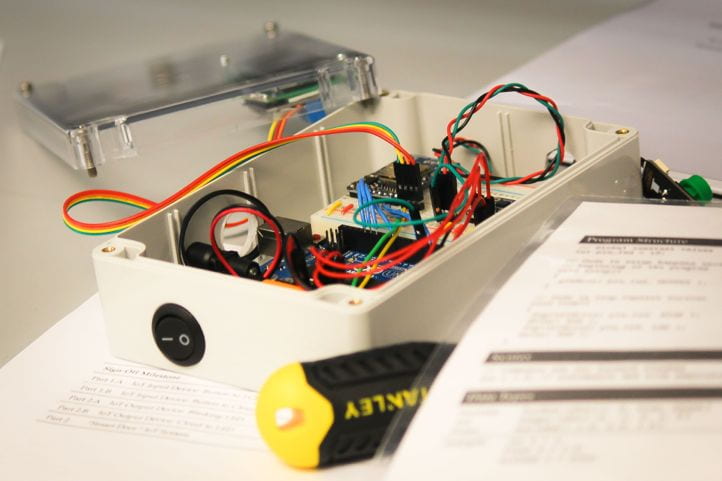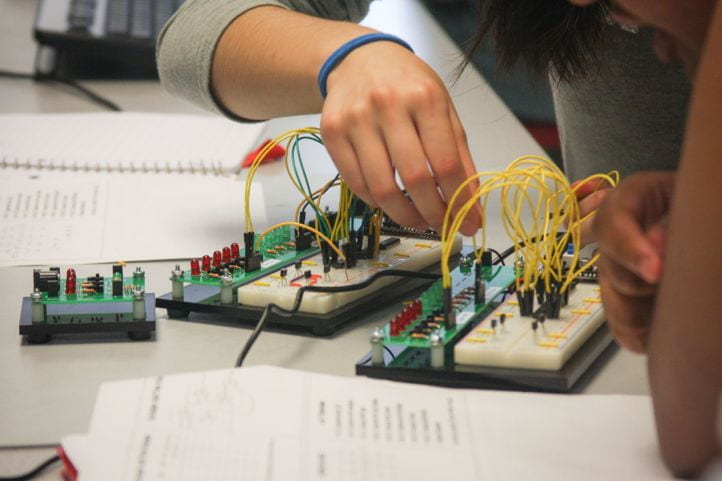Computing at the Edge
Faculty Director: Christopher Batten
Department: School of Electrical and Computer Engineering, Cornell University
Note: The 2021 program was held online and this project was adapted.
Project Description
Although the Internet has traditionally been thought of as interconnecting computing systems such as servers, workstations, laptops, and smartphones, in reality, the Internet interconnects people. Human beings must collect, enter, publish, and analyze almost all of the information that is transmitted over the Internet. The Internet of Things (IoT) is used to interconnect everyday physical objects “at the edge” of the network such that these objects can autonomously collect data, interact with the real world, and communicate with a centralized cloud. IoT wearable devices can monitor health and notify doctors of issues in real-time. IoT devices in smart buildings can carefully track the behavior of occupants to automatically optimize energy efficiency. IoT devices can attach to bridges for traffic profiling, structural monitoring, and early flash-flood detection. IoT has the potential to be a disruptive technology impacting many diverse aspects of our society including health care, energy, environmental conservation, manufacturing, retail, commerce, and transportation.
Designing new IoT devices for computing at the edge requires an interdisciplinary background, and the field of computer engineering is well-situated to serve as a foundation for students interested in this emerging area. Computer engineering sits at the interface between hardware and software, and it involves blending the traditional fields of electrical engineering and computer science. Computer engineers are equally comfortable building embedded computers and exploring new sensor circuits as they are programming web applications and analyzing algorithms. Students studying computer engineering over the next five years will have a unique opportunity to shape how this proliferation of connected devices will change our society.
The 2021 CURIE Scholars will explore “Computing at the Edge” by designing, building, and testing one of several simple IoT devices inspired by real-world applications of IoT. The week will begin with preliminary laboratory sessions where scholars can learn about computer engineering from both the hardware perspective (e.g., building a simple calculator out of basic logic gates) and the software perspective (e.g., programming a simple microcontroller). The scholars will then transition to working in groups on an IoT system centered around one of several themes including smart home, early disaster warning, wearable health monitoring, wildlife tracking, and smart electrical power grids.
Faculty Director Bio
Christopher Batten is an Associate Professor in the School of Electrical and Computer Engineering at Cornell University, where he leads a research group working at the intersection of computer architecture, electronic design automation, and circuit design. In 2018, he was a Visiting Scholar at the Computer Laboratory at the University of Cambridge, UK and a Visiting Fellow at Clare Hall also in Cambridge, UK. His work has been recognized with several awards including a Cornell Engineering Research Excellence Award, an AFOSR Young Investigator Program award, an Intel Early Career Faculty Honor Program award, an NSF CAREER award, a DARPA Young Faculty Award, and an IEEE Micro Top Picks selection. His teaching has been recognized with the Ruth and Joel Spira Award for Excellence in Teaching and two Michael Tien ’72 Excellence in Teaching Awards. Prior to his appointment at Cornell, Batten received his Ph.D. in Electrical Engineering and Computer Science from the Massachusetts Institute of Technology in 2010. He received an M.Phil. in Engineering as a Churchill Scholar at the University of Cambridge in 2000, and received a B.S. in Electrical Engineering as a Jefferson Scholar at the University of Virginia in 1999.




